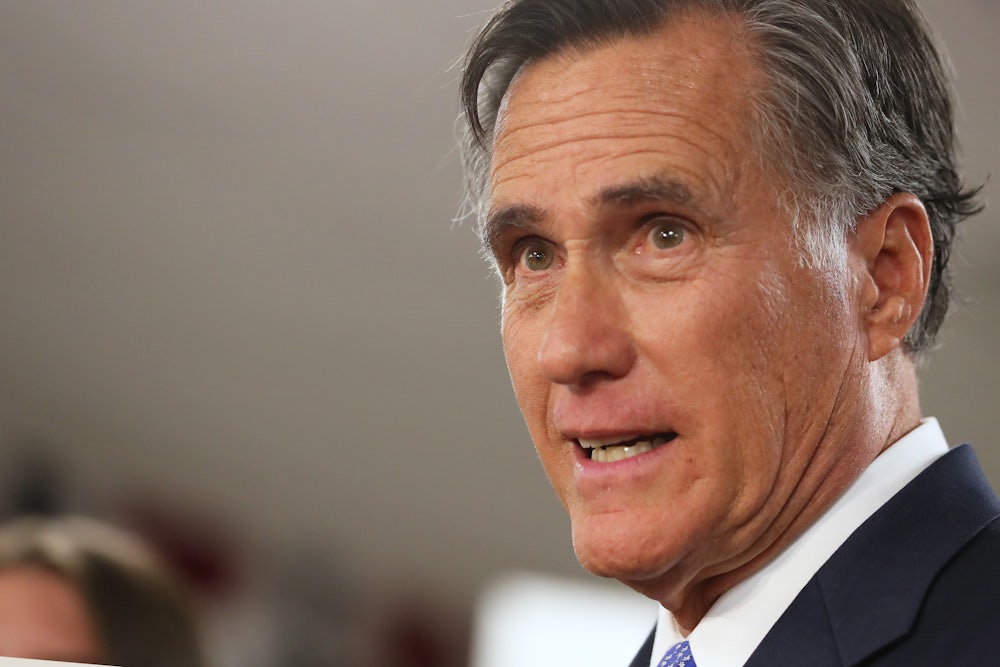Mitt Romney isn’t a big fan of this Donald Trump character, and he really wants you to know it. The former Republican presidential candidate and Utah’s newest senator wrote a Washington Post op-ed on Wednesday in which he said the president has not “risen to the mantle of the office.” This is an understatement, to say the least. Trump is crass and belligerent, thoughtless and undisciplined, racist and sexist. Reaching this conclusion is like announcing that January is the first month of the year.
Such critiques nonetheless comprise a well-trod genre for a small minority of Republican lawmakers. The authors are typically elder statesmen who could withstand any electoral blowback, like the late John McCain, or retiring senators like Bob Corker who no longer needed to worry about it. Jeff Flake, Arizona’s departing senator, carved out a national reputation over the last two years by begging the president to be a nicer person, all while doing little to obstruct his policy agenda in any meaningful way.
Romney’s latest writing is a declaration of sorts that he, too, will join the ranks of the Op-Ed Republicans when he takes his seat later this week. Trump himself noted the similarities on Wednesday morning, asking on Twitter if the new senator would turn out to be “a Flake.”
Here we go with Mitt Romney, but so fast! Question will be, is he a Flake? I hope not. Would much prefer that Mitt focus on Border Security and so many other things where he can be helpful. I won big, and he didn’t. He should be happy for all Republicans. Be a TEAM player & WIN!
— Donald J. Trump (@realDonaldTrump) January 2, 2019
This is a relatively mild rebuke by Trump’s standards, which suggests he sees Romney as minor a threat as Flake was. “He agrees with many of the things we’ve done, and many of the things we have in mind, and we’ll see what happens,” Trump told reporters on Wednesday afternoon.
That’s a fair reading of Romney’s op-ed. “It is not that all of the president’s policies have been misguided,” he wrote. “He was right to align U.S. corporate taxes with those of global competitors, to strip out excessive regulations, to crack down on China’s unfair trade practices, to reform criminal justice and to appoint conservative judges. These are policies mainstream Republicans have promoted for years. But policies and appointments are only a part of a presidency.”
What’s most striking about the op-ed is what it doesn’t mention. There are no complaints about Trump’s draconian approach to immigration, perhaps because Romney himself helped pave the way for his hardline policies. During the 2012 primaries, he outflanked the rest of the field from the right by calling for policies that would pressure immigrants to “self-deport” as an alternative to mass deportations. The years have not tempered his views: “I’m also more of a hawk on immigration than even the president,” Romney told a Utah crowd in March.
Romney’s op-ed reveals a selective memory at play. His version of events begins with his own decision not to endorse Trump in 2016. But during the 2012 campaign,
Romney appeared alongside Trump to accept his endorsement, a decision that helped pave the way for Trump’s subsequent rise to power: It validated his racist campaign to pressure President Obama into releasing his birth certificate, and signaled that he had power and influence within the Republican Party. Romney’s pointed non-endorsement in 2016 was too late to wash away the imprimatur of legitimacy.
The narrative also, conveniently for Romney, focuses on what happened in the last month of 2018. “The Trump presidency made a deep descent in December,” his op-ed began, as he lamented the departures of Defense Secretary Jim Mattis, White House Chief of Staff John Kelly, and other figures whom establishment Republicans saw as stabilizing figures within the administration. Criticizing Trump’s actions prior to the midterm elections would have been slightly awkward for Romney: He welcomed the president’s endorsement in his own Senate campaign.
Some observers rushed to praise Romney for his perceived declaration of independence. “For better or worse, Mitt Romney has joined the resistance,” The Week’s Joel Mathis wrote on Wednesday. Rick Wilson, a prominent #NeverTrump conservative consultant, was euphoric. “Yes, we’ve seen a handful of truth-tellers in the Senate,” he wrote in The Daily Beast, “but they rarely hit so keenly as today’s Romney nuke strike.” If complaining that Trump has not “risen to the mantle of his office” is a nuclear detonation, even the most conservative of Democrats should be sent to the Hague.
Whenever Trump leaves office, there will be a debate about whether Trumpism can exist without him. Former Attorney General Jeff Sessions showed that it could be enforced as a policy platform, but there’s not much evidence it can survive as an electoral strategy beyond its namesake. This may be what irks the Op-Ed Republicans the most, and why they complain about Trump’s style instead of his substance: They largely agree on the latter, but realize the former is the key to his political success. There’s not a huge constituency for a polite Trump. If there were, Romney would be halfway through his second term.
